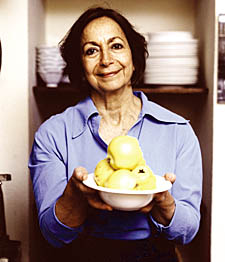
Claudia Roden |
Cooking with Claudia to give peace a chance
Cookery guru Claudia Roden wants to bring about peace in the Middle East through good food, writes Ruth Gorb
Arabesque by Claudia Roden
Michael Joseph Ltd, £25 order this book
IN Claudia Roden’s ideal world, there could be a solution
to the gridlock of hatred in the Middle East. “If only”,
she says, “the food world would have an influence on politics.
I feel that food is so benign that it brings people together.”
She speaks from experience. In researching her new book, which
explores the cookery of Morocco, Turkey and Lebanon, she has
done what she has always done – she has been to the countries,
she has met the people and asked them about their traditional
food.
She says: “They knew I was Jewish, but even in places where
there were Hizbollah banners in the streets, I got a wonderful
reception.”
To read Claudia Roden is to be transported into another world.
As a cookery writer she is up there with the greats, Elizabeth
David and Jane Grigson, but with her peerless, almost poetic
prose, she takes her readers into another realm. She has turned
food into romance, and in that she stands alone.
She lives in a quiet corner of Hampstead Garden Suburb, her
arts and crafts house surrounded by the Sleeping Beauty garden.
At the heart of the house is her kitchen, and that is where
you sit.
“I am always here,” she says. Her voice is soft, her
conversation fascinating as she talks about the medinas of Morocco
with their fountains and mosaics and the scent of jasmine, the
markets of Istanbul, the riverside cafés of Lebanon.
She has been to them all. Travelling and cooking and writing,
she says, is her way of life.
And that is the essence of her work. Her recipes come from primary
sources, from the people who cook. The reason is simple: there
were usually no books to refer to. When she wrote her first
book, A Book of Middle Eastern food, no cookbook existed in
Egypt, Claudia Roden’s own country.
She says: “People didn’t write recipes down, they
handed them down. My recipes come from family and friends, and
ever since then I am always being given recipes, new things
– years of collecting.”
Her Middle Eastern heritage is a constant in her life, She was
born and brought up in Cairo to a distinguished Jewish family – her grandfather was the Chief Rabbi of Aleppo in northern
Syria.
She finished her education in Paris, and in 1956, at the time
of Suez, the family come to live in London. Her first training
and career was as an artist but she became interested in food
as a reflection of her ancestors’ lives.
“I started the book at a time when a mosaic of people –
from Salonica, from Egypt, from Aleppo, people like my family
– were looking for somewhere new to live,” she says.
“I felt that in losing our countries we were losing our
culture. I wanted to capture our traditions – and in that
first book I captured a lost community.” Strange as it
must seem now, with A Book of Middle Eastern Food one of the
great classics of cookery writing, it took a while for it to
take off.
There was antipathy towards the Middle East and people were
not ready to hear about its cuisine. Now, says Claudia Roden,
gastronomy has detached itself from politics, and the West has
appropriated the food of everywhere.
Her latest book is aimed at a sophisticated audience, one that
does not lump the whole of the Middle East together, but has
eaten in Moroccan, Lebanese and Turkish restaurants – there
are photographs of places in London, such as Green Lanes, where
you can buy Turkish and Moroccan food.
There are some classic recipes, such as Moroccan lamb with prunes,
and aubergine Imam Bayeldi, and different versions of old ones:
a new Lebanese kibbeh, one that Claudia Roden did not know,
is the best she has tasted.
She is, she says, addicted to travel, to the excitement of discovering
a new city, and rediscovering old friends. No, she was not at
all apprehensive before she went to the Middle East. “Yes,”
she says, “there is anti-Semitic feeling there, and people
have had terrible experiences. The only bad remark I had made
to me was, ‘Why did the Jews put David Irving in prison?’
“But, you know, Jews and Arabs have a lot in common; they
both laugh all the time, and it’s that humour I know. Even
at the worst time, as it is now, I feel optimistic.”
She speaks in biblical and historical terms. She talks of national
dishes eaten by the Pharaohs, and of the Jews who left Egypt
in her own lifetime and still feel they are part of an exodus.
“I’ve had my exodus,” they say to her, “and
I’m still yearning for your cooking.”
|


